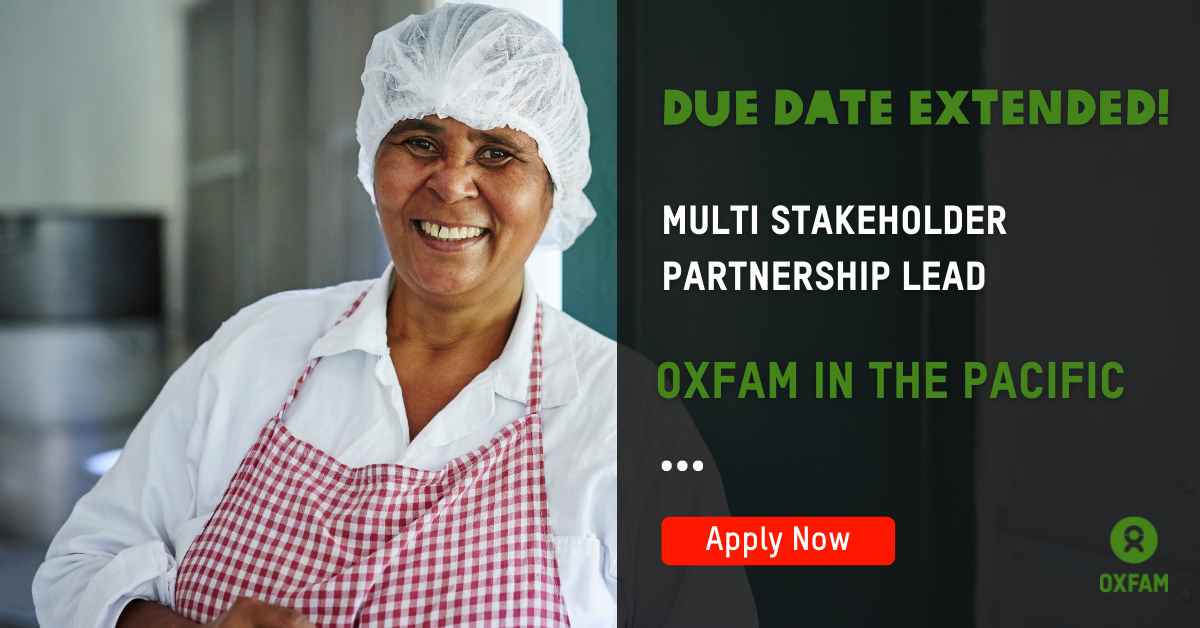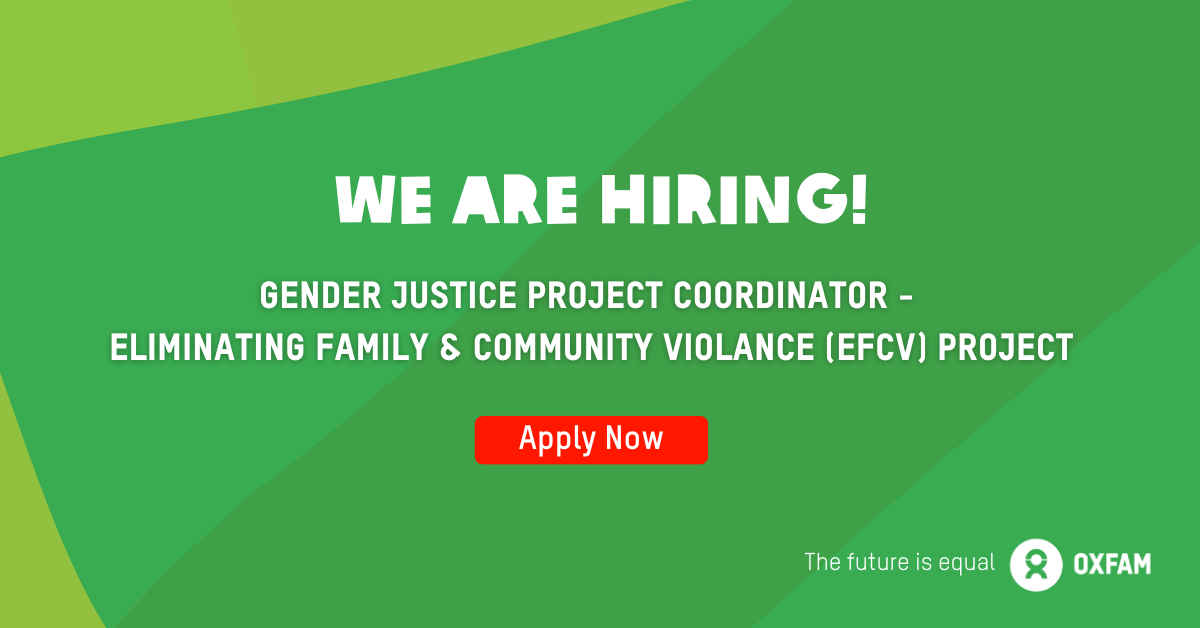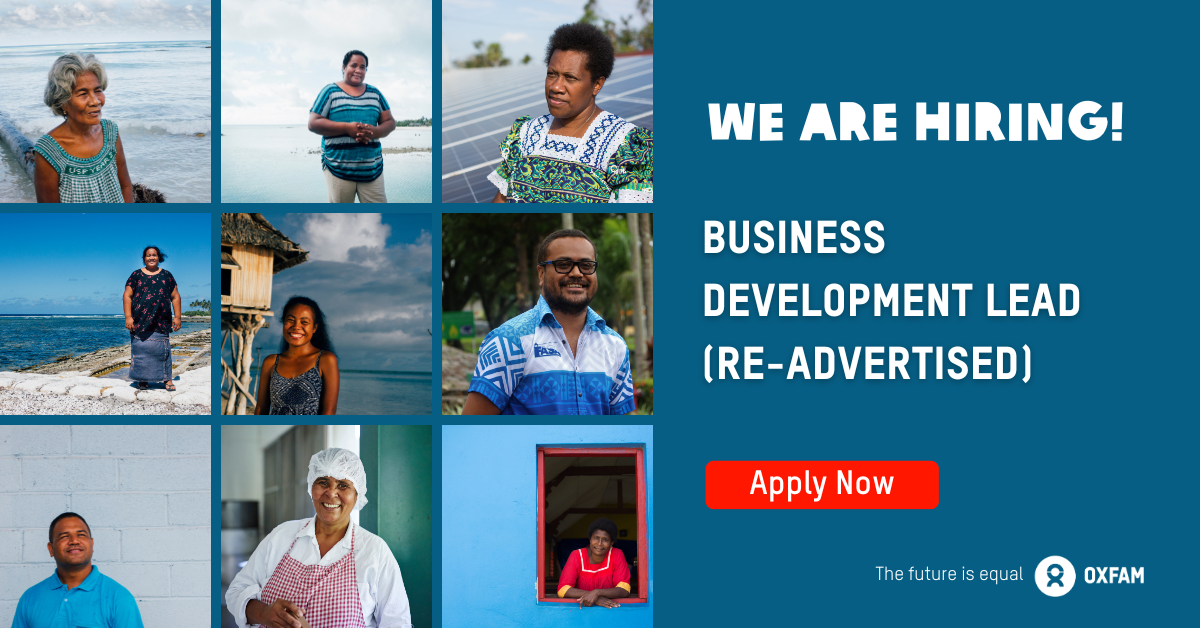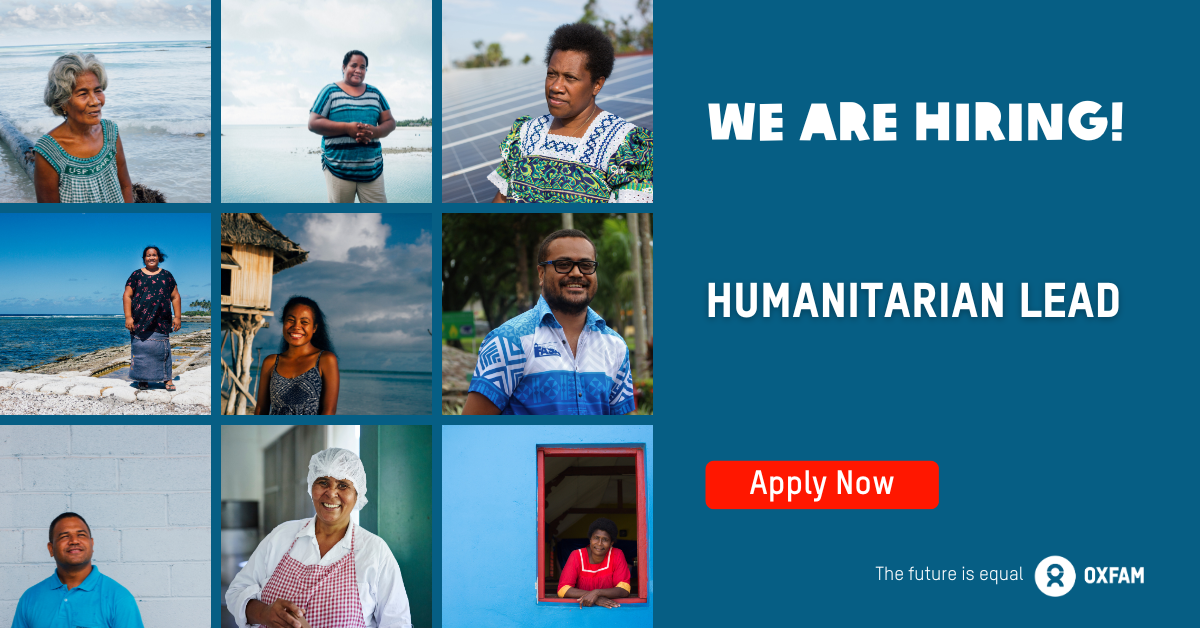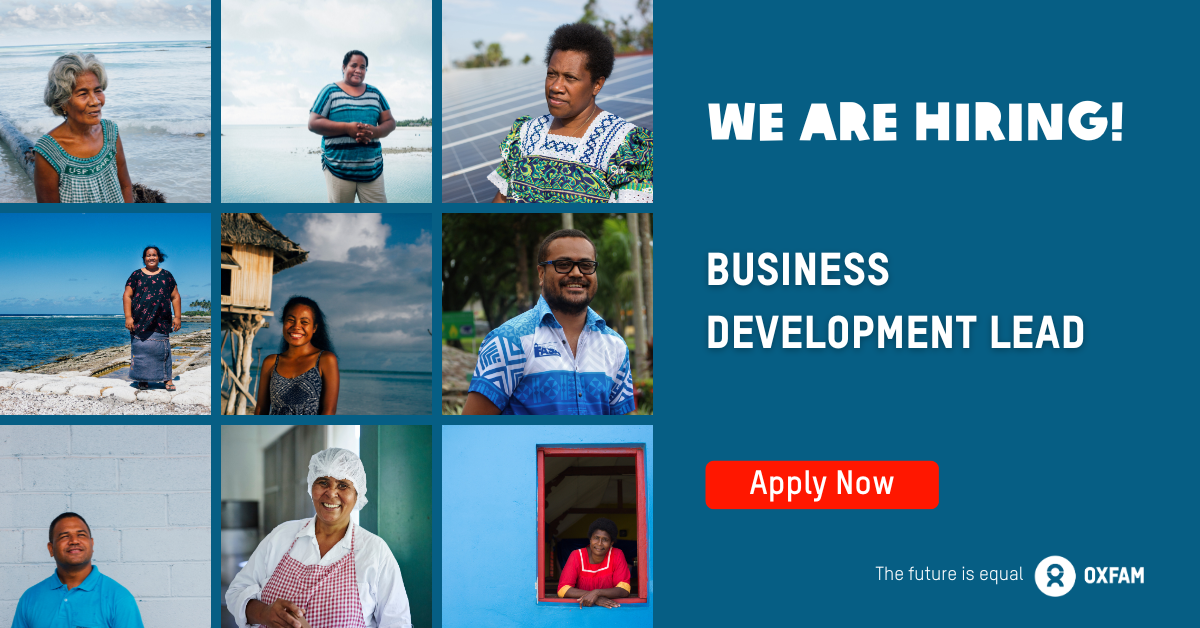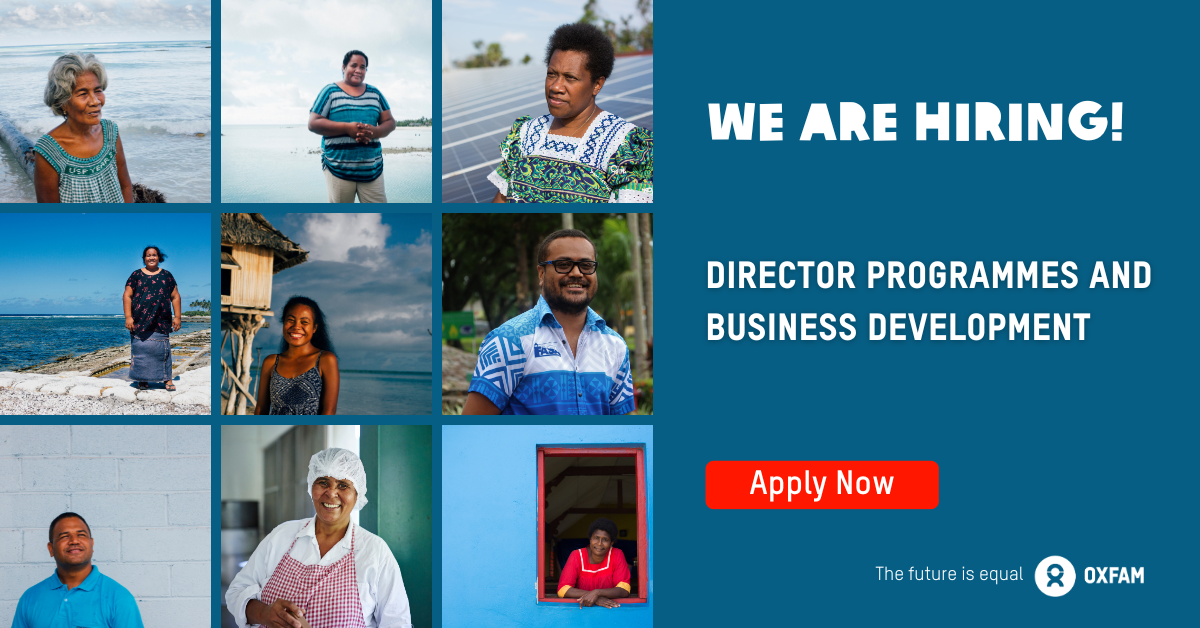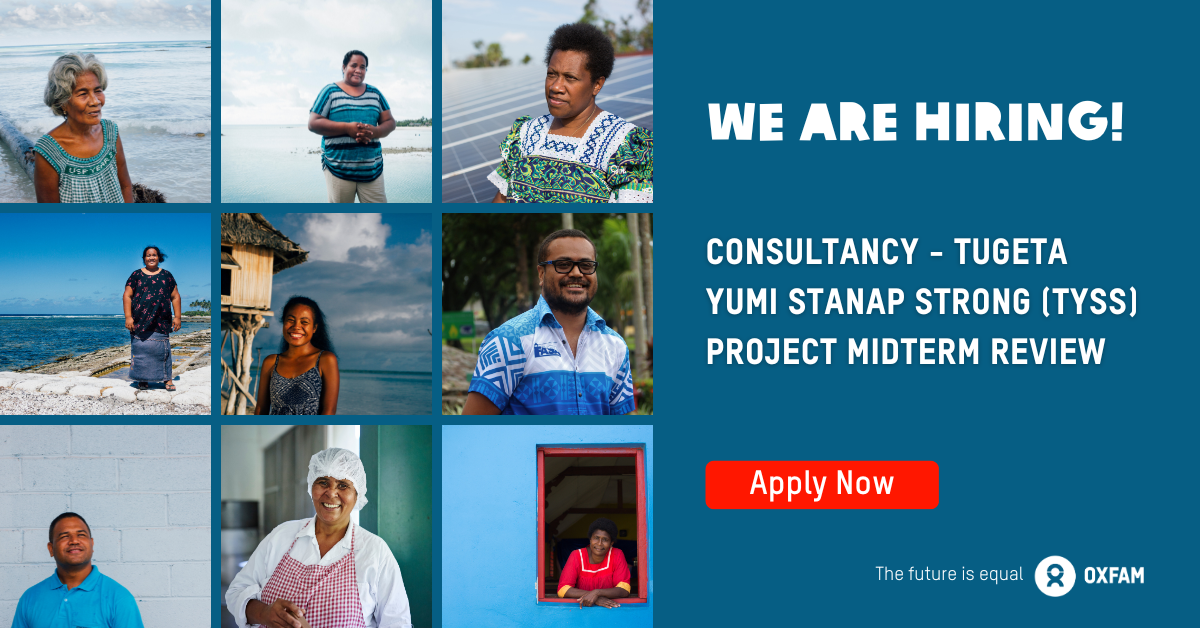OXFAM IN THE PACIFIC VACANCY
- Role: MULTI STAKEHOLDER PARTNERSHIP LEAD
- Applications for this role will now close on: Friday 2nd December 2022
- See full Job Description here:
Multi Stakeholder Partnership Lead
- Location of role: Pacific Region
- Salary Grade: C1 (based on country location)
- Term: 2 years
- For any further assistance please contact [email protected]
Applications are invited for the position of:
MULTI STAKEHOLDER PARTNERSHIP LEAD
Context:
Oxfam in the Pacific’s regional strategy is focussed on achieving change in three thematic areas: Climate Justice, Economic Justice and Gender & Citizen Justice. To do this, we currently work primarily with national and regional NGOs and CBOs but also with national and sub-national levels of government and regional institutions. We’re working directly or through partners in Papua New Guinea, Solomon Islands, Vanuatu, Fiji, Tuvalu, Kiribati, Palau, the Federated States of Micronesia (FSM), Republic of the Marshall Islands (RMI), Tonga and Samoa. Our approach is rooted in collective action. We believe that single actors and agencies cannot solve complex development issues on their own. The engagement of diverse and sometimes divergent group interests is required. We seek to build strong networks, mutual understanding, and collectively lift our capacity to enable collaboration, influencing and accountability. We aim to support stronger cross-sector engagement in the region, shifting from siloed sectoral approaches to development challenges. The Multi Stakeholder Partnerships Lead role is pivotal to this ambition. Our work is guided by Oxfam’s global values and by Pacific culture and values including openness, flexibility, respect, equity, justice, solidarity, collaboration, sharing and humility. We value local leadership and ownership.
The role:
At Oxfam in the Pacific, we aim to be a partner of choice for organisations working on social impact. As we embed great partnership practice at the core of how we work, the Multi Stakeholder Partnerships Lead manages and guides the implementation of our organisation-wide partnership approach. This encompasses culture, systems and competencies that support us to develop and maintain the strategic relationships with civil society groups, faith-based and traditional institutions, state and private sector actors at different levels needed to achieve impact.
Our partnership approach cuts across our processes for identification, co-initiation, co-creation and collaboration on program design and implementation. Ensuring that our partnership practice is anchored by evidence and that we are learning from and improving our partnership work in an ongoing and systematic way are also key aspects of this role. The MSP Lead manages the design and development of multi-stakeholder partnerships at the organisation level and provide guidance to, and mentoring of program and other functional teams, which are planning, developing and managing partnerships for change. Providing capacity development support to our partners on strengthening their own partnership practice is also a key aspect of this role. As a functional lead within the Oxfam in the Pacific structure, the MSP Lead is a member of the Senior Leadership Team and, working closely with the Director PELI plays a key role in the management of the PELI Hub through representation, strategic thinking, and planning.
Key Responsibilities and Accountabilities
Strategy
• Actively contribute to Oxfam in the Pacific strategic planning processes, championing partnership as core to our identity and ways of working.
• Lead development and implementation of organisation-wide partnership strategy for Oxfam in the Pacific, working closely with the Director PELI and in consultation with team leads.
Program and Delivery
• Partnership building, networking and engagement: In collaboration with program and influencing colleagues, identifies and maximizes strategic opportunities for Oxfam’s engagement in select multi-stakeholder platforms to advance Oxfam’s influencing, programmatic and partnership goals.
Technical support
• Provides technical advice, practical guidance and hands-on support to Oxfam teams and partners to strengthen partnership practice including:
- the identification of potential partnerships
- the initiation, planning and design of partnerships, supported by appropriate partnership modalities including advice on the preparation of appropriate partnership agreements, in consultation with other teams responsible for contractual and financial matters.
- the management, monitoring and learning about partnerships once established.
Capacity Building
• Provides partnership capacity building support including training, to staff across the organisation on strategies and best practices to identify and develop multi stakeholder partnerships to advance strategic, programmatic and influencing priorities.
• Knowledge, Learning & Adaptation: Input to MEAL processes in place to monitor and regularly reflect and learn about our partnerships. Ensures that such learning is captured and communicated internally in such a way to facilitate ongoing evolution and adaptation of our partnership practice.
• Develops content, thought leadership and subject matter expertise. Provides inputs into briefing materials and other communications as needed.
•Communications: Supports the development and delivery of key messages related to partnerships to internal and external audiences. Provides inputs and develops content/articles.
•Ensures that learning on partnerships is communicated internally and externally, including through participation in development fora (e.g., working groups, panels conferences)
Technical Skills, Experience & Knowledge
Essential
Transformational Partnership practice
• Deep understanding of the transformational nature of equitable partnerships from demonstrated experience in a development and/or humanitarian context in the Pacific
• Significant experience of and proven ability to build, sustain, and manage strong partnerships and work collaboratively with a wide variety of organizations including government agencies, CSOs, NGOs, and private sector institutions.
• Proven ability to work collaboratively in partnership with a range of partners.
• Demonstrated capacity to develop and influence partnership strategy.
• Ability to role model good partnership practice and coach others to support it Feminist practice.
• Commitment to Oxfam values and policies, including Safeguarding and Child Protection.
• Openness to the application of feminist principles for all aspects of development work.
• Ability to demonstrate sensitivity to cultural differences and gender issues, and commit to equal opportunities
Program development & management
• Sound understanding of programme design and management
• Demonstrated track record of improving efficiency and effectiveness in areas of responsibility
• Excellent knowledge and experience of people development, particularly in relation to capacities and capabilities in partnership Innovation
• Demonstrated ability to identify and implement opportunities for innovation
• A problem-solving, customer-oriented attitude, approach and track-record
• Previous experience of managing and developing a team with a demonstrated capacity to lead and motivate others
• Demonstrated ability to hold self and others responsible for delivering concrete results on country and regional level, while informing and supporting global level work
• Excellent communication skills and fluency in written and spoken English
Education
• Degree in relevant field or discipline including Development, Sociology, Psychology, Public Administration
Desirable
• Advanced degree in a relevant field
•Experience working with private sector actors
• Ability to work in a Pacific Island language
Organisational Values
• Accountability – Our purpose-driven, results-focused approach means we take responsibility for our actions and hold ourselves accountable. We believe that others should also be held accountable for their actions.
• Empowerment – Our approach means that everyone involved with Oxfam, from our staff and supporters to people living in poverty, should feel they can make change happen.
• Inclusiveness – We are open to everyone and embrace diversity. We believe everyone has a contribution to make, regardless of visible and invisible differences.
• Committed to a rights-based approach including an active commitment to putting women’s rights at the heart of all we do as well as the rights of other marginalized people in all aspects of an organization’s work.
Safeguarding
Oxfam is committed to preventing any type of unwanted behaviour at work including sexual harassment, exploitation and abuse, lack of integrity and financial misconduct; and committed to promoting the welfare of children, young people and adults. Oxfam expects all staff and volunteers to share this commitment through our code of conduct. We place a high priority on ensuring that only those who share and demonstrate our values are recruited to work for us.
Child Safeguarding
As an agency undertaking work both nationally and internationally and in humanitarian response, Oxfam in the Pacific takes its duty of care seriously to safeguard children and recognises that it must meet community expectations and the trust placed in its personnel to maintain the highest standards of conduct with children. Therefore, all are required to understand and comply with the Child Safeguarding Policy, Code of Conduct, toolkit and Social Media User Policy.

